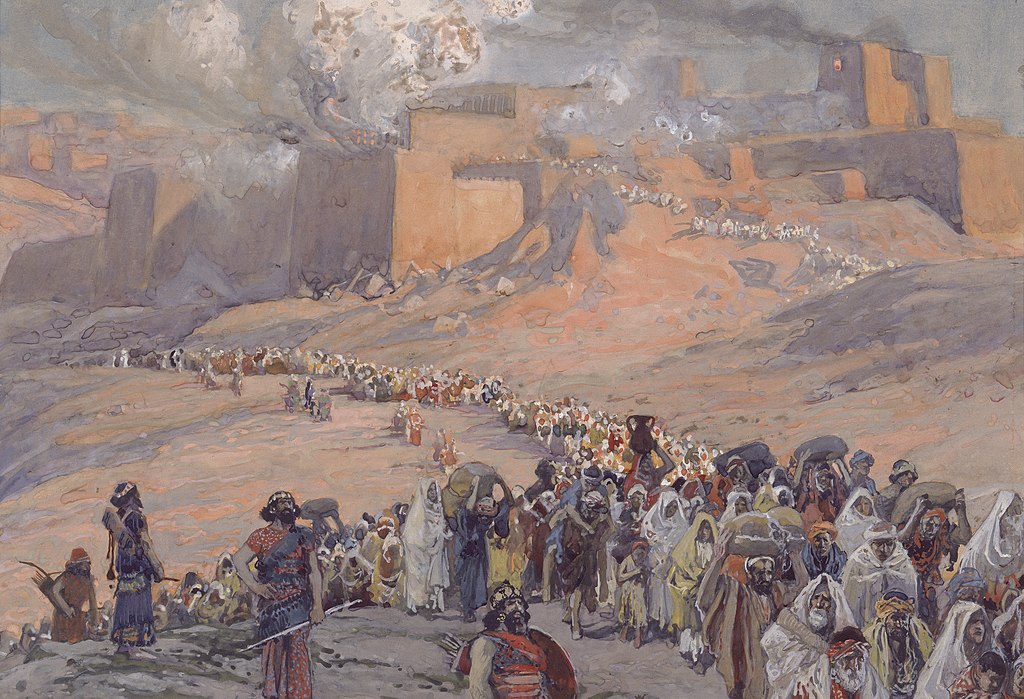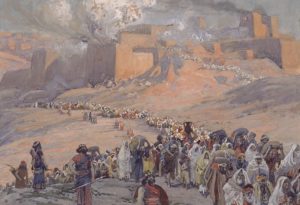THE BABYLONIAN CAPTIVITY by Vladimir Moss

James Tissot, The Flight of the Prisoners Babylonian Captivity
THE BABYLONIAN CAPTIVITY

Babylonian Captivity
Written by Vladimir Moss

Vladimir Moss
THE BABYLONIAN CAPTIVITY
God punished the northern kingdom of Israel for its impiety by sending the Assyrians to destroy it before destroying the instrument of His wrath (Isaiah 10.15) – a pattern that we find throughout history. In 586 He punished the southern kingdom of Judah for similar impiety by sending Nebuchadnezzar, king of Babylon, to destroy the Temple and exile the people to Babylon. For “the Lord, the God of their fathers, constantly sent to them by His messengers, because He had compassion on His people and on His dwelling place. But they kept mocking the messengers of God, despising His words, and scoffing at His prophets, until the wrath of the Lord rose against His people until there was no remedy. Therefore He brought up against them the king of the Chaldeans, who slew their young men with the sword in the house of their sanctuary, and had no compassion on young man or virgin, old man or aged: He gave them all into his hand” (II Chronicles 36.15-16).
The Jews had hoped to rebel against the Babylonians by appealing to the other despotic kingdom of Egypt. But the Prophet Jeremiah rebuked them for their lack of faith. If God wills it, he said, He can deliver the people on His own, without any human helpers, as He delivered Jerusalem from the Assyrians in the time of Hezekiah.
However, national independence had become a higher priority for the Jews than the true faith. The only remedy, therefore, was to humble their pride by removing even their last remaining vestige of independence. Therefore, said the Prophet, “bring your necks under the yoke of the king of Babylon, and serve him and live! Why will you die, you and your people, by the sword, by the famine, and by the pestilence, as the Lord has spoken against the nation that will not serve the king of Babylon… And seek the peace of the city where I have caused you to be carried away captive, and pray to the Lord for it; for in its peace you will have peace…” (Jeremiah 27.12-13, 29.7).
Nebuchadnezzar’s conquest of Jerusalem and carrying away of the Jews to Babylon writes L.A. Tikhomirov, “was understood by the Jews as a punishment of God for their apostasy and corruption. In Babylonia, therefore, there began a process of repentance and regeneration. But on the other hand, a powerful spiritual temptation awaited the Jews. Chaldea at that time had become an advanced country of pagan culture. In respect of religion, it preserved all the charms of the magic of ancient Sumeria and Akkad, adding to it the astronomical and astrological science of Assyrian star-gazing, which, as we have seen, were already practiced in Judah in the reign of King Josiah. The three main branches of ‘Chaldean wisdom’ combined a considerable fund of real scientific knowledge with the higher philosophy worked out through the ages by the mind of the Assyrio-Babylonians, combined with the teaching of Zoroaster and offshoots of Hinduism. Paganism presented itself before the captives from Jerusalem as a huge intellectual power armed with everything that men could learn and assimilate at that time.
“To this, we must add that Babylon had attained the highest level of political might and represented a remarkable system of state structure which was hardly excelled by all the ancient states. A profoundly worked out law guaranteed the inhabitants’ rights, and the Babylonian citizens of other tribes here came upon such perfect civil conditions as they could not even imagine in their native countries. The agriculture, industry, and trade of Babylon were at a high level of development. As captives of another tribe, crushed materially and morally, recognizing that they had betrayed their Lord, the Jews came into a country that was striking by its might, glitter, wealth, knowledge, developed philosophical thought – everything by which one nation could influence another. If they ‘sat by the waters of Babylon and wept’, dreaming of revenge on the destroyers of their fatherland, they also could not help being subjected to the influences of Chaldean wisdom.
“They had grown up in the thousand-year conviction of the loftiness of their chosen people, of which there was no equal upon the earth. They remembered amazing examples of the help of the Lord in the past when He had crushed the enemies of Israel, including the Assyrians themselves. They were filled with determination to raise themselves to the full height of their spirit and their providential mission. On the other hand, they did not have the strength not to submit to the intellectual influence of Babylon. In general, the age of the Babylonian captivity was the source of very complex changes in Israel. In the higher sphere of the spirit, prophetic inspirations finally matured to the vision of the nearness of the Messiah. In the conservative layer of teachers of the law there arose a striving to realize that ‘piety of the law’, the falling away from which, as it seemed to all, had elicited the terrible punishments of God. There began the establishment of the text of the law and the collection of tradition; an embryonic form of Talmudic scholarship was born. Beside it, the masses of the people involuntarily imbibed the local pagan beliefs, and the teachings of ‘Chaldean wisdom’ was reflected in the minds of the intelligentsia; there was born the movement that later expressed itself in the form of the Cabbala, which under the shell of supposedly Mosaic tradition developed eastern mysticism of a pantheistic character…”[1]
In His parable of the good figs and the bad figs, the Lord indicated that the Babylonian captivity was for the good of those exiled but for the punishment of those who remained behind: “Like these good figs, so will I acknowledge those who are carried away captive from Judah, whom I have sent out of this place for their own good, into the land of the Chaldeans. For I will set my eyes on them for good, and I will bring them back to this land. I will build them and not pull them down and not pluck them up. Then I will give them a heart to know Me, that I am the Lord, and they shall be My people, and I will be their God, for they shall return to Me with their whole heart.
“And as the bad figs which cannot be eaten, they are so bad – surely thus says the Lord – so will I give up Zedekiah the king of Judah, his princes, the residue of Jerusalem who remain in this land, and those who dwell in the land of Egypt.” (Jeremiah 24.5-8).
And yet, as we read in both Jeremiah and Ezekiel, even among the exiles, many did not repent and did not return to Jerusalem, staying among the pagans and learning their ways. At the same time, the books of Daniel, Esther, and Tobit show that piety was not completely extinguished even among those Jews who stayed in Persia. Eventually, a pious remnant, stirred up by the Prophets Haggai and Zechariah, returned to Jerusalem under Zerubbabel to rebuild the Temple.
*
The Babylonian captivity,” writes Deacon Pavel Serzhantov, “was permitted as a means of punishing the people, as a penance. The time of destruction and punishment came to an end, and the time of creation and repentance began, the time of the mercy of God. The Lord leads His people through severe testing—such trials that it seems to some that God abandoned His people and forgot about them, not sympathizing with their suffering, not paying heed to the lawless invaders. Is this really how we should understand it? No. For he that toucheth you toucheth the apple of His eye (Zechariah 2:8).”[2]
Zechariah was not the only prophet sent by God to comfort the suffering Jews. In a sermon delivered in Shanghai in 1948, St. John Maximovich said: “There was no limit to the grief and despondency of the ancient Jews when Jerusalem was destroyed and they themselves were led away into the Babylonian captivity.. Where are Thine ancient mercies, O Lord, which Thou swarest to David? (Psalm 88:50), they cried out. But now Thou, hast cast off and put us to shame… They that hated us spoiled for themselves and Thou scatterest us among the nations (Psalm 43:10-12).
“But when it seemed that there was no hope for deliverance, the Prophet Ezekiel, who was likewise in captivity, was made worthy of a wondrous vision. And the hand of the Lord came upon me, he says of this. The invisible right hand of the Lord placed him in the midst of a field full of human bones. And the Lord asked him: Son of man, will these bones live? And the Prophet replied: O Lord God, Thou knowest this. Then the voice of the Lord commanded the Prophet to say to the bones that the Lord will give to them the spirit of life, clothing them with sinews, flesh, and skin. The Prophet uttered the word of the Lord, a voice resounded, the earth shook, and the bones began to come together, bone to bone, each to its own joint; sinews appeared on them, the flesh grew and became covered with skin, so that the whole field became filled with the bodies of men; only there were no souls in them. And again the Prophet heard the Lord, and at His command, he prophesied the word of the Lord, and from the four directions souls flew to them, the spirit of life entered into the bodies, they stood up, and the field was filled with an assembly of a multitude of people.
“And the Lord said, Son of man, these bones are the whole house of Israel; and they say, Our hope has been lost, we have perished… Behold, I will open your tombs and will bring you up out of your tombs, My people, and I wilt put My spirit within you and ye shalt live, and I will place you upon your own land (Ezekiel 37:1-14).
“Thus the Lord God revealed to Ezekiel that His promises are steadfast and that what seems impossible to the human mind is performed by the power of God.
“This vision signified that Israel, after being delivered from captivity, would return to its own land; in a higher sense, it indicated the settlement of the spiritual Israel in the eternal heavenly Kingdom of Christ. At the same time, there is prefigured also the future General Resurrection of all the dead.”[3]
*
The drama of the Jews’ return from exile began one night in 539 BC, when Belshazzar the son of Nebuchadnezzar, was feasting with his lords, wives, and concubines, drinking in the very same holy cups that had been taken by his father from the Temple in Jerusalem. At that point, a mysterious hand appeared writing on the wall. The Prophet Daniel was summoned and said: “This is the interpretation of each word. MENE: God has numbered your kingdom and finish it; TEKEL: You have been weighed in the balances and found wanting. PERES: Your kingdom has been divided and given to the Medes and Persians.” (Daniel 5.26-29)
That very night Babylon was conquered, and Belshazzar killed, by Cyrus the Great, King of the Medes and Persians, one of the greatest rulers of history, whom the Lord even called “My anointed” (Isaiah 45.1), although he was a pagan.
Cyrus extended the Persian empire to the east and the west and practiced a remarkable degree of national and religious toleration for his time.[4] He immediately freed the Jews and allowed them to return to Jerusalem and rebuild the Temple. The Lord had saved His people through His anointed king…
Moreover, according to Yuval Noah Harari, it was Cyrus who introduced one of the most important political ideas in history: the idea that an empire can exist for the benefit of all its subject peoples, not just the dominant nation. “For the kings of Assyria always remained the kings of Assyria. Even when they claimed to rule the entire world, it was obvious that they were doing it for the greater glory of Assyria, and they were not apologetic about it. Cyrus, on the other hand, claimed not merely to rule the whole world, but to do so for the sake of all people. ‘We are conquering you for your own benefit,’ said the Persians. Cyrus wanted the peoples he subjected to love him and to count themselves lucky to be Persian vassals. The most famous example of Cyrus’ innovative efforts to gain the approbation of a nation living under the thumb of his empire was his command that the Jewish exiles in Babylonia be allowed to return to their Judaean homeland and rebuild their temple. He even offered them financial assistance. Cyrus did not see himself as a Persian king ruling over Jews – he was also the king of the Jews, and thus responsible for their welfare…
“In contrast with ethnic exclusiveness, imperial ideology from Cyrus onward has tended to be inclusive and all-encompassing. Even though it has often emphasized racial and cultural differences between rulers and ruled, it has still recognized the basic unity of the entire world, the existence of a single set of principles governing all places and times, and the mutual responsibilities of all human beings. Humankind is seen as a large family: the privileges of the parents go hand in hand with responsibility for the children.”[5]
Of course, the word “empire” has become associated with evil institutions that were ethnically exclusive – Hitler’s empire is the most famous example. Nevertheless, multi-national empires have in general been more universalist in their ideology than smaller groupings centered[ebayfeedsforwordpress feed=”https://www.ebay.com/itm/Orthodox-Christian-Byzantine-Complete-5-piece-Chalice-set-Sterling-Silver/312332951987?hash=item48b87ea1b3:g:iS4AAOSwiSVb9uyk:rk:2:pf:0″ items=”1″] on the power and glory of a single nation. And this remains the abiding glory of Cyrus the Great, the first non-Jewish “anointed of the Lord”. His imperial ideology was to be inherited by Rome. And from there it descended to the Second Rome of Constantinople and the Third Rome of Russia…
June 14/27, 2018.
St. Methodius, Patriarch of Constantinople.
[1] Tikhomirov, Religio-Filosofskie Osnovy Istorii (The Religio-Philosophical Foundations of History), Moscow, 1997, pp. 135-136.
[2] Serzhantov, “The Apple of the Almighty’s Eye”, Orthodox Christianity, February 21, 2017, http://orthochristian.com/101230.html.
[3] St. John, “Will these Human Bones Come to Life?” The Orthodox Word, No. 50, May-June, 1973.
[4] Jaime Alvar Ezquerra, “Dawn of Persia”, National Geographic Magazine, September/October 2016, 34.
[5] Harari, Sapiens. A Brief History of Mankind, London: Vintage, 2011, pp. 218, 219.






